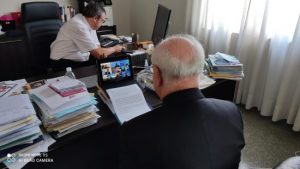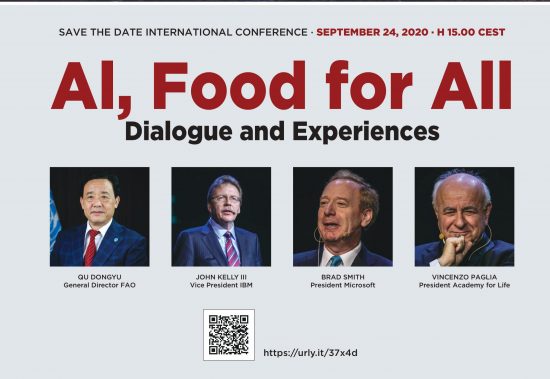Artificial Intelligence best-practices in agriculture can help bridge the digital divide while tackling food insecurity FAO, IBM and Microsoft focus on concrete and sustainable ways Artificial Intelligence can be used in line with ethical principles endorsed by Pope Francis
24 September 2020, Rome – The Food and Agriculture Organization of the United Nations (FAO), IBM and Microsoft, at an event organized today with the Pontifical Academy for Life, relaunched a commitment towards developing forms of Artificial Intelligence (AI) that are inclusive and promote sustainable ways to achieve food and nutrition security. The aim of the online event: AI, Food for All. Dialogue and Experiences is to reinforce and build upon the Rome Call for AI Ethics endorsed by Pope Francis and co-signed by FAO, IBM and Microsoft at a conference hosted by the Academy in February.
Today’s discussions also focused on concrete ways through which AI can contribute to achieving the goal of feeding an estimated global population of nearly 10 billion by 2050, and to do this while safeguarding natural resources and addressing challenges such as climate change and the impacts of shocks including COVID-19.
Examples of best practices in the use of AI and digital technology in agriculture, and which are openly accessible in the form of digital public goods, were also presented.
“The implementation of clearly Western technologies in food production and food processing significantly affects the food cultures of the populations of the Earth. We must feed everyone, but not everyone must necessarily eat the same things,” said Archbishop Vincenzo Paglia, President of the Pontifical Academy for Life. The protection of biological diversity (human, plant, animal diversity) must be the focus of our attention and must guide the whole process, from the design phases (ethics by design) to the way in which these are proposed and spread in different social and cultural contexts,” he added.
“Transforming our food systems requires innovative solutions to ensure food security and nutrition for all,” said FAO Director-General QU Dongyu. At FAO, together with the development of AI tools, we work towards the establishing the International Platform for Digital Food and Agriculture – an inclusive multi-stakeholder forum for identifying and discussing the potential benefits and risks of digitalization of the food and agricultural sectors. For this aspect we really appreciate and expect colleagues from the AI and the digital giants to offer us assistance, cooperation and engagement to help the (FAO) member countries and the farmers,’” he added.
“As society has grappled with an alarming public health emergency, uses of technology in response to COVID-19 have only underscored why the Rome Call for AI Ethics and its underlying principles are so critical to humanity’s future,” said John E. Kelly, III, IBM’s Executive Vice President. “Only by putting people, their interests and their values at the center of our thinking about the future of technology can we all emerge stronger from global challenges such as the pandemic and food security.”
“At Microsoft, we believe technology can help unlock solutions for some of the world’s biggest challenges,” said Microsoft President Brad Smith.
“Technologies such as AI and Machine Learning tools will be particularly helpful as we work to address worldwide hunger and food insecurity issues, especially in a world grappling with climate change. These tools can forecast issues and respond with critical resources that help prevent future famines and save lives.”
AI in agriculture, a crucial opportunity to achieve sustainable development Artificial Intelligence has an important role to play in transforming food systems and helping to address food and nutrition insecurity. In the agricultural sectors, it can do so in several ways, including optimizing or even carrying out some human activities, such as planting and harvesting, thus increasing productivity, improving working conditions – by reducing the amount of time and toil – and using natural resources more efficiently, including through better knowledge management and planning.
In particular, as e-agriculture technology advances rapidly, AI in farming is emerging in three major areas: agricultural robotics, soil and crop monitoring, and predictive analytics. Progress in these areas can, in the context of climate change, population growth and depleting natural resources, contribute greatly to soil and water conservation which are increasingly key to achieving food security in a sustainable way.
At today’s event, two examples of best practices in the use of AI in agriculture were presented:
- FAO’s WaPOR portal which monitors and reports on agriculture water productivity over Africa and the Near East. It provides open access to the water productivity database and its thousands of underlying map layers, and also allows for direct data queries, time series analyses, area statistics and data download of key variables associated to water and land productivity assessments;
- The Agricultural Stress Index System (ASIS) is a quick-look indicator developed by FAO for the early monitoring of agricultural areas with a high likelihood of water stress/drought at global, regional and country level, using satellite technology. Drought affects more people than any other type of natural disaster and is the most damaging to livelihoods, especially in developing countries.
Putting people, including farmers, at the centre The Rome Call for AI Ethics stresses that “AI systems must be conceived, designed and implemented to serve and protect human beings and the environment in which they live,” a concept that many participants at today’s event reiterated.
Underpinning the Rome Call are several key principles including: transparency, in that AI systems must be explainable; inclusion, so that the needs of all human beings are taken into account and they are offered the best possible conditions to express themselves and develop; and impartiality, so that such technologies do not create or act according to bias, to the advantage of just a few.
In relation to these principles, and in the context of the use of AI in agriculture, the partners and co-signatories to the Rome Call recognize the need to protect the rights of farmers and the knowledge that they possess, particularly those in developing countries. There is also a need to bridge the digital divide – 6 billion people are without broadband today, 4 billion without internet, 2 billion without mobile phones and 400 million people are without a digital signal and there are also significant gaps in access to resources between men and women, young and old.
The partners to the Rome Call have urged countries and the public sector, to take advantage of the opportunities presented by AI to support smallscale farmers and enhance rural development, poverty eradication and improvement of food security. To do so they should invest in human capital and put in place policies and regulations that minimize the risk of exclusion and inequality.

Quotes from our Conference:
FAO Director General Qu Dongyu: The new frontiers of AI can have a tremendous impact on food productivity and processing. Farming, transportation, sustainability can benefit from AI. Now the agricultural machinary are based on data and softwares. Environment and food security must be taken into consideration when designing AI tools. Microsoft President Brad Smith: AI must serve people. The Rome Calls really broke new grounds by incluyding sustainability and environment in the discussion. We need to expand Internet connectivity. We still live in a world where 40% of people do not have access to Internet. We need to change that.
IBM Vice President John Kelly III: What we can do is use the power of AI for more informed decisions about a farm’s crops. In the next five years, we will replicate nature’s abilility to convert nitrogen in the soil into nitraterich fertilizer, feeding the growing world while reducing the environmental impact of fertilizers. Approximately 1 trillion dollars of food is lost or wasted every year. The power of AI and Blockchain can enable distribution of food quickly and broadly to mitigate spoilage, loss and reduce waste. Archbishop Paglia: In fact, we must reflect and intervene, each according to his or her their own responsibilities, so that the obvious, but not inescapable, connection between new technologies and power structures is not all-powerful in its ability to control and manipulate markets and democracies at the global level. We must reflect and work together to ensure that the undeniable influence of the digital industry as a supranational influencer does not lessen freedom of choice and always remains within democracy’s mainstream. In all of this, the Call for an Ethics of Artificial Intelligence signed seven months ago is still bold, still viable.
The text is a genuine call for mutual understanding, for honest dialogue, for common commitment to a shared vision and specific action. I hope that over the coming months many others will want to learn more about the Call, and in their turn sign on to it. The dream of a table set for a feast with the all the best that field and sea can offer, a table where all are welcome, is a dream that all of us must work to make come true.
Italian:
L’iper-specializzazione scientifica che caratterizza la ricerca contemporanea, la predominanza culturale assunta dall’approccio economico e l’obiettiva marginalizzazione di ogni riflessione umanistica corrono seriamente il rischio sia di farci perdere di vista la meta sia di offrire risposte che siano all’altezza della dignità della vita umana.
Di fatto, dobbiamo riflettere e intervenire, ognuno secondo le proprie responsabilità, affinché l’evidente, ma non obbligata, connessione tra nuove tecnologie e strutture di potere sia disinnescata, soprattutto nella sua capacità di controllare e manipolare mercati e democrazie a livello planetario. Dobbiamo riflettere e lavorare insieme, affinché l’innegabile affermarsi dell’industria digitale quale potenza sovrannazionale non comprima gli spazi della libertà nelle scelte e si collochi sempre nell’alveo democratico.
Experiences
FAO’s WAPOR: We need to produce our food more efficiently; we need to increase water productivity through a combination of better water control, improved production process and key methodologies as evapotranspiration (calculated by energy balance models) and biomass (calculated by light use efficiency model).
Agricultural Stress Index System (ASIS): Asis is a computer based expert system which simulated the analysis that remote sensing experts and agronomists would undertake and simplifies the interpretation and usage
of remote sensing data. Then the country-level ASIS is a country-owned system which can ingest the local knowledge thus is yields more precise results than the global ASIS.
Final greetings by Archbishop Paglia: our job now is to have more and more companies, governments, universities, Ngo’s and others, to sign the @call_rome to create a movement for a Human-Centric #AI! Thanks to @BradSmi @FAODG #JohnKellyIII @Microsoft @IBM and all the staff involved. An many thanks to my collaborators at the @PontAcadLife (Excerpts by Leonardo Stefanucci and Fabrizio Mastrofini



